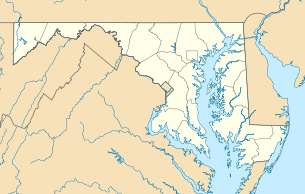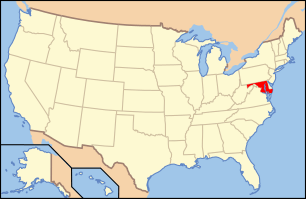Jerusalem Mill Village
|
Jerusalem Mill Village | |
 | |
|
Jerusalem Mill at Jerusalem Mill Village, August 2012 | |
 | |
| Location | Jerusalem and Jericho Rds. Jerusalem, Maryland, U.S. |
|---|---|
| Coordinates | 39°27′41″N 76°23′23″W / 39.46139°N 76.38972°WCoordinates: 39°27′41″N 76°23′23″W / 39.46139°N 76.38972°W |
| Area | 27 acres (11 ha) |
| Built | 1772 |
| Architect | Lee, David; Et al. |
| Governing body | State |
| NRHP Reference # | 87001400[1] |
| Added to NRHP | August 20, 1987 |
Jerusalem Mill Village is a living history museum that spans the 18th through early 20th centuries. One of the oldest and most intact mill villages in the U.S. state of Maryland, Jerusalem is located in Harford County, along the Little Gunpowder Falls River. It also serves as the headquarters of the Gunpowder Falls State Park.[2] The site was added to the National Register of Historic Places on August 20, 1987.[1] Also on the National Register of Historic Places and located nearby are Jericho Farm and the Jericho Covered Bridge.
History
The 318-acre (129 ha) tract of land called Jerusalem was patented to Nicholas Hampstead and John Walley in 1687. By 1743, the tract had been acquired by an ironmaster, Stephen Onion, and had been enlarged to 368 acres (149 ha) with several buildings. When Onion died in 1750, his nephew, Zacheas Barrett Onion, acquired the property. Onion engaged Isash Linton of Bucks County, Pennsylvania to come to Jerusalem to improve the existing ironworks and mill. Linton was joined by his family and partner David Lee. He eventually built eight water-powered mills along the Little Gunpowder. The fourth mill was completed in 1772 and is now the centerpiece of the living history park.[3]
The village functioned at a Quaker village into the early 20th century. Evidence suggests that David Lee and several of his Quaker neighbors carved black walnut stocks and assembled rifles for the Continental army in the gunshop that stands behind the gristmill. During the Civil War, on July 11, 1864, Harry Gilmor stopped at the General Store in Jerusalem Mill, now popularly known as McCourtney's, capturing supplies and horses, as part of Gilmor's Raid.
After the Civil War, the buildings in the village were gradually leased out and sold. A succession of owners operated the gristmill until 1961, when it was then purchased by the State of Maryland to be part of the Gunpowder Falls State Park.[3]
The historic buildings are maintained by the Maryland State Parks, volunteer support, and the Friends of Jerusalem Mill Village. Efforts are currently underway to stabilize and preserve the Lee Family's historic Bank Barn.[4]
Gallery
-
Jerusalem Mill at Jerusalem Mill Village, December 2009
-
Jerusalem Mill Village Marker, December 2009
-
Jerusalem Mill Village-Gun/Cooper Shop, December 2009
-
Jerusalem Mill Village-Blacksmith Shop, December 2009
-
Jerusalem Mill Village-McCourtney's Store, December 2009
-
Jerusalem Mill Village-Tenant Farmhouse, December 2009
-
Jerusalem Mill Village-Bank Barn Ruins, December 2009
-
Jerusalem Mill Village-Milestone, December 2009
References
- ↑ 1.0 1.1 "National Register Information System". National Register of Historic Places. National Park Service. 2009-03-13.
- ↑
- ↑ 3.0 3.1 "Jerusalem Mill Village". Jerusalem Mill Village. Friends of Jerusalem Mill. 2008-04-15.
- ↑ "Percy Lee Dairy Farm Foundation". Retrieved 13 September 2013.
External links
- Jerusalem Mill Village, Harford County, including photo from 2002, Maryland Historical Trust website
- Jerusalem Mill Village website
- Jerusalem Grist Mill, Jerusalem Road vicinity, Little Gunpowder River, Jerusalem, Harford, MD at the Historic American Buildings Survey (HABS)
| |||||||||||||||||||||||||









